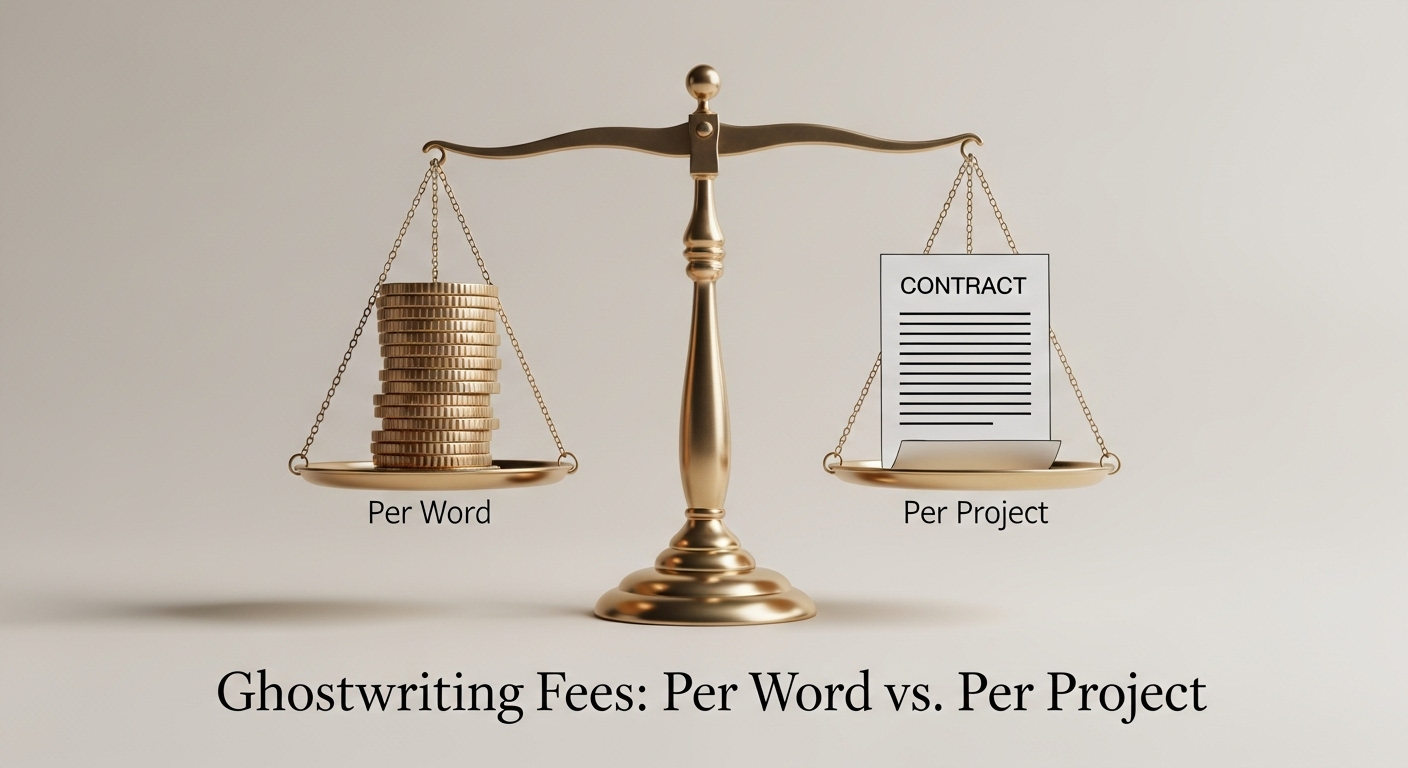
When hiring a ghostwriter, one of the most confusing aspects for clients is understanding how fees are structured. Should you pay by the word, or opt for a flat project fee? The answer depends on several factors including your budget, the nature of the project, expected quality, and deadlines. This article explores both pricing models in depth, giving you insight into what to expect and how to choose the right arrangement for your book, blog, memoir, or business content.
Table of Contents
ToggleUnderstanding Ghostwriting: A Quick Overview
Ghostwriting is the process of hiring a professional writer to create content that is officially credited to someone else. It could be a business executive’s book, a celebrity memoir, blog posts, website content, or even social media scripts. Ghostwriters remain behind the scenes, but their work is often pivotal in conveying a client’s message effectively and professionally.
Because ghostwriting is a skill-intensive, laborious job that requires research, voice matching, confidentiality, and often multiple rounds of edits, pricing can vary widely.
The Two Most Common Pricing Structures
1. Per Word Pricing
This is perhaps the most straightforward way of pricing ghostwriting services. A writer quotes a fee for every word they write. For example, if a ghostwriter charges $0.50 per word and writes a 10,000-word eBook, the total fee would be $5,000.
Pros of Per Word Pricing:
- Transparency: Clients know what they are paying for, and writers know what they’re being paid.
- Flexibility: It allows room for changes in length without renegotiating the entire project.
- Easy Comparison: It’s easier to compare rates among different ghostwriters when all quote per word.
Cons of Per Word Pricing:
- Not always reflective of the work involved: A 1,000-word thought piece may require extensive research and interviews, making per-word pricing less profitable for the writer and potentially misleading for the client.
- Encourages padding: Writers might be tempted to inflate word count to increase fees.
- Not ideal for collaborative or fluid projects: If the content changes frequently or involves constant revisions, per-word pricing can become complicated.
Typical Per Word Ranges
- Beginner Ghostwriters: $0.05 – $0.15 per word
- Experienced Ghostwriters: $0.20 – $0.50 per word
- Top-Tier or Celebrity-Level Ghostwriters: $1 – $5+ per word
Rates also depend on the type of content. A blog post or article will usually cost less per word than a high-stakes business book or political memoir.
2. Per Project Pricing
This model involves setting a flat rate for the entire project. It could be based on a full book, a series of blog posts, or a specific deliverable with an agreed-upon timeline, scope, and number of revisions.
Pros of Per Project Pricing:
- Budget certainty: Clients know the total cost upfront, which is helpful for financial planning.
- Focus on quality, not quantity: Writers are incentivized to create high-impact content without worrying about word count.
- Better suited for complex projects: Long-term book projects or brand-based content strategies are often best handled this way.
Cons of Per Project Pricing:
- Requires clear scope definition: Misunderstandings can arise if the deliverables or expectations change mid-project.
- Less flexibility for additions or revisions: Unless pre-negotiated, clients may incur extra charges for scope creep.
- Tough for first-time clients: It can be hard for clients unfamiliar with the writing process to assess whether the quoted fee is fair.
Typical Per Project Fee Ranges
The range for per-project ghostwriting fees can vary drastically depending on the project’s scope and the writer’s experience:
- Short Articles or Blog Posts (500–1,000 words): $200 – $1,000
- eBooks (10,000–30,000 words): $3,000 – $25,000
- Full-Length Nonfiction or Memoirs (40,000–80,000 words): $15,000 – $100,000+
- Business Whitepapers or Thought Leadership Reports: $1,000 – $10,000
In most per-project agreements, writers build in fees for research, outlining, revisions, and sometimes interviews or calls.
Factors That Influence Pricing
Whether per word or per project, ghostwriting fees are influenced by the following factors:
Writer’s Experience and Niche
Top-tier ghostwriters with a track record in publishing, journalism, or branding command higher rates. Specialized fields like health, law, or finance may also justify higher fees due to the research involved.
Client’s Requirements
A project that demands a specific tone, involves interviews, or needs multiple rounds of approval will cost more than a straightforward informational piece.
Deadline
Rush jobs typically increase pricing. If you need a 50,000-word manuscript in a month, expect to pay premium rates.
Revisions and Collaboration
Some ghostwriters include two or three rounds of revisions in their quote. More than that, or changes beyond the agreed scope, may incur extra charges—particularly in per-project pricing.
Publishing Support
If the ghostwriter is also providing editing, formatting, cover design advice, or help with finding a publisher, those services come with additional costs.
Which Pricing Model Should You Choose?
Choosing between per word and per project depends largely on the type of work you’re commissioning and your working style.
Per Word Is Better When:
- The deliverable is short, clearly defined, and not expected to change.
- You want to test a ghostwriter’s skill before committing to a larger project.
- The budget is flexible and based on the actual output.
Per Project Is Better When:
- You have a long-term, complex, or multi-stage project.
- You want budget predictability and are willing to define scope clearly.
- You prefer not to worry about word count and want the focus to be on content quality.
Hybrid Models: A Common Compromise
Many professional ghostwriters use hybrid models to balance risk and fairness. For example, a writer might charge a flat project fee but stipulate that if the final manuscript exceeds a certain word count, an additional per-word fee applies. Alternatively, a writer might propose milestones—charging a percentage upfront, another mid-project, and the remainder upon completion.
This approach allows flexibility and accountability for both sides while preserving professional standards.
Red Flags to Watch For
When negotiating ghostwriting fees, be cautious of:
- Extremely low rates: This may indicate inexperience, rushed work, or lack of quality.
- Lack of clarity: Ambiguous contracts or vague pricing structures are problematic. Always ensure the scope, number of revisions, timeline, and payment schedule are clearly documented.
- No revision policy: Every serious ghostwriter includes a revision clause to avoid misunderstandings.
Final Thoughts
Ghostwriting is an investment in your story, business, or brand. Whether you pay by the word or by the project, the most important factor is hiring someone whose expertise matches your vision. Pricing models exist to make collaboration smoother, not to complicate it. If you’re transparent about your expectations and open to professional guidance, either model can serve you well.
The key is to evaluate the scope, understand the value of the service, and enter into a well-structured agreement that benefits both you and your ghostwriter.
FAQs
Q1: Is per-word or per-project cheaper?
It depends on the project’s scope and complexity. Short pieces may be cheaper per word, while longer, detailed work is often better priced per project.
Q2: Why do ghostwriting fees vary so much?
Fees vary based on the writer’s experience, content type, research required, and timeline.
Q3: Can I negotiate ghostwriting fees?
Yes, but experienced ghostwriters often have standard rates. It’s best to discuss your budget and expectations openly.
Q4: Are revisions included in the fee?
Most ghostwriters include a set number of revisions. Additional changes may be charged extra.
Q5: Do ghostwriters offer contracts?
Yes. A contract outlining scope, fees, deadlines, and rights is standard and protects both parties.





